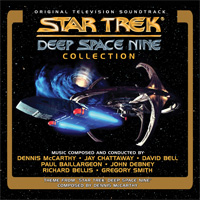 We continue our interview with Ford A. Thaxton who worked as a producer on the recent Star Trek: Deep Space Nine Soundtrack Collection from La-La Land Records. The set marks the first release of music solely dedicated to Deep Space Nine in 20 years after GNP Crescendo put out the original soundtrack to the shows pilot, “Emissary” composed by Dennis McCarthy back in 1993 (the label did release two “Best Of” compilations featuring music from the show, albeit limited to just a few tracks a piece).
We continue our interview with Ford A. Thaxton who worked as a producer on the recent Star Trek: Deep Space Nine Soundtrack Collection from La-La Land Records. The set marks the first release of music solely dedicated to Deep Space Nine in 20 years after GNP Crescendo put out the original soundtrack to the shows pilot, “Emissary” composed by Dennis McCarthy back in 1993 (the label did release two “Best Of” compilations featuring music from the show, albeit limited to just a few tracks a piece).
This is the second part of our interview with Ford. You can read the first part here. TrekCore caught up with producer Ford A. Thaxton to discuss the music of Deep Space Nine, his motivation behind track choices, Star Trek composers and how to whittle down 172 episodes full of music to a 5-hour compilation! We’ve also got a selection of sample tracks for your listening pleasure at the bottom of the page.
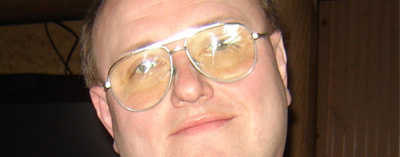
Ford A. Thaxton: Star Trek DS9 Soundtrack Interview, Part 2
Interviewed by Adam Walker for TrekCore.com
![]()
TrekCore: Rick Berman’s intervention on “What You Leave Behind“, as you described it – was that commonplace throughout the series?
Ford A. Thaxton: Oh yeah, absolutely. What happens on a dub stage, on a television show in particular – people need to remember that movies are a director’s medium; TV shows are a producer’s medium. What would happen, to my understanding, is that they’d put the show together, and they’d have a playback for the brass – Rick – [who] would give them comments. In this particular case, that can happen; they move cues around, or don’t use them, or pull them under dialogue to where you virtually can’t hear them. It happens all the time in television – but on Star Trek… ooooh yeah, it would happen.
The most notable example I can think of is: Ron Jones wrote a big cue, something that he had written for one episode that was completely replaced – I think it was for “Booby Trap” or something. That happens; it’s part of the game. Just so everyone knows, when you hear this, this is what the composers wrote, recorded, and delivered. What [the producers] do after that, oh well.
The other thing with David Bell – the score we always heard from people [to include] was “Sacrifice of Angels“. I always knew we were going to include that because another character dies. Dukat’s daughter – you’re dying? You’re on the set! We knew that was there, and there was a big moment with the Klingons coming to the rescue. Another character dies in the Dave Bell section – Gowron! Gowron dies? You’re there! David Bell’s work was just wonderful.
The composer who had the most surprising thing was Gregory Smith. He only did, I think, three episodes; we included two. Gregory, I believe, was an orchestrator for Jay Chattaway – it’s in the notes – I wasn’t at all familiar with his work, really, beyond the show; I know that he later conducted the new recording of the Star Trek main title they included on the remastered editions. In his case, his two scores – one was [“The Assignment“], where Keiko’s taken over by a pah-wraith, and they have a big finish where he figures out how to get the pah-wraith out of her; the real surprise was the next show he did –
TrekCore: “Field of Fire“.
Ford A. Thaxton: Yeah – that one was musically interesting; it had Ezri Dax going back and dealing with her serial killer/composer host. Gregory had to write a little music there, which was piano-oriented for that character. We put on the best stuff, and that’s the one score where I wish we could have put a little more on. I just listened to it and said, “Wow!” – I had never really paid attention to it – “This is a really good one!” I’m very happy we were able to include that.
Then, Paul B. came in – Paul tended to get episodes that were atypical; they tended to assign him shows that were a little out of format, for the lack of a better word. Of the three shows we included, the first one was “Little Green Men“, with the whole Roswell thing, and he had written this great cue, this whole five-minute thing where they escape, the A-bomb goes off, and they time travel back – it was just great; it was won we just had to include.
Another show he did, later on, was “Children of Time“. It was a very emotional show; a whole alternate timeline, one of those things that they did so well… I still subscribe to the Miles O’Brien comment of “I hate temporal mechanics!” There was a four-minute sequence in that show where they were planting seeds; I heard it on the reel, and said, “That’s it; that’s the one!” Not even a question.
The last thing – the thing that I always knew was going to end the disc – was the score for “The Siege of AR-558“, which was the last two cues of the last act, the war adagio and the cue as the replacements come in and they all beam out. It was one of the most unique musical moments in the history of DS9, because the music carried it – they actually designed it so that the score was going to be there in lieu of sound effects; it’s just an incredibly powerful moment. I always knew that was going to end it.
That’s the biggest nut to crack on any of these: how you start it, and how you finish it. The truth of it is, if you know the first score you’re going to use, and how that’s going to start things off – and you know where you’re going to end – for everything in the middle, you just have to find the rhythm of it. In this case, we always knew that every disc would have the main and end titles, because there were several versions of it; several different mixes. I always knew that the fourth CD was going to end with a recording that my own company – BSX Records – had commissioned Dennis to do; a solo piano recording of the DS9 theme, which is a lot of fun. It’s called “After 3:00AM at Quark’s” – basically, the idea when you listen to it, is that we envisioned Dennis as the lounge pianist at Quark’s, it’s after 3:00AM, the bar’s closed, Rom and Nog and Quark counting the latinum, the dabo girls are straightening up the place, and Dennis is just sitting there doodling away at the end of the night.
That was a long-winded explanation, but when you hear it, that’s it – Dennis is just, “That’s it – closing time!”
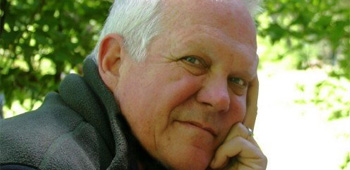
Dennis McCarthy composed the iconic theme to Deep Space Nine. This collection features a beautiful jazz piano riff on that theme with the piece entitled 3:00AM at Quarks
TrekCore: When you were first going through this music when you were presented the reels, how is it archived? I remember that when I spoke to Neil Bulk he was saying how the scores from the Original Series had to go through this big restoration process in Australia…
Ford A. Thaxton: I don’t know what they did there, so I can’t comment on that. What happened here was, over the years we’re talking about – the latter part of the 20th Century, the early part of the 21st – the composers mostly had all of their music material in their archive on DATs; many of them got session DATs, which had everything on them. Some of them, we have transferred from the DAT medium onto drives. The difference between the two shows is that when they did the original Star Trek, when they found all those reels, that was all on that old format; nobody ever thought there’d be albums of that.
Fast forward to now: it’s all recorded digitally in Hollywood with some great engineers – Armin Steiner, and all those guys – it was all in good shape. It was all digitally preserved, and the biggest problem was the voluminous amount of material you had to go through to get it down to what mattered. You also pretty much know when you’re listening to a cue and it really sounds cool – and you hear somebody from the booth going “Can we have an alternate, please?” – no no no. You hear the alternate, and you realize the original version was the better one as a rule.
It was well archived. It got transferred and went to James Nelson; he did his magic and made it all sound good. He’s been doing a lot of Star Trek stuff and archiving for Dennis and Jay. It was pretty straight ahead.
TrekCore: When you were going through this huge bulk of music, there must have been some surprises along the way that you never expected to find…
Ford A. Thaxton: Well, they actually do end up on the album! One of the people I want to make sure gets mentioned is John Davis at Precision Audio who transferred a lot of stuff for us. When we were going through it, he would say, “Hey, I heard something you might want to pay attention to.” They’re on the box set.
One of the things we included, which we discovered in the sessions, is that at the last session for “The Changing Face of Evil” – Jay Chattaway’s last show – Jay gave a little speech to the orchestra about working on the show and how the producers believed in the music. We included that, because you don’t often hear the composer talk about the whole thing. The joke of it is at the end of it – he says, “After this next cue, they’re probably going to come and say ‘Hey Jay, that really is terrible!’” What we did is go from that into the source cues from “Our Man Bashir“, which is just about as un-Star Trek as it gets!
But Jay gives this wonderful speech. We also included a little thing at the end of Dennis’ CD, after they did the last cue for DS9, where he gives a little thing to the orchestra, thanking them for everything – “…and we’ll be back for Mr. Voyager!” – and they all applaud. We had fun stuff like that.
This set has five hours of previously unreleased material, and the only two things that are repeated from other sources is the Vedek Bareil cue from “Life Support“, and the piece from “The Visitor” – which we included again because I really liked them, and didn’t want to do the set without ‘em…. and if you don’t agree with me, frak off!
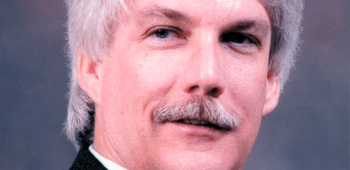
Jay Chattaway contributed a huge body of musical work to Deep Space Nine including the celebrated compositions for episodes such as “Call to Arms” and “The Changing Face of Evil“
TrekCore: How do you think the show’s soundtrack changed over the years? Has it been like an evolution of music?
Ford A. Thaxton: I think, when you listen to it – or watch the show itself – if you go back and look at it now, you see in the first year where it was still kind of TNG-esque. They started, very early on, changing – the show first started changing when we met Garak… musically, the composers – all of them – tended to respond to the fact that Deep Space Nine was a vastly darker story. The thing of it is, every character in that show, pretty much, is really damaged. When you look at every one of the principle characters, everybody is damaged goods. As it when along, I think, the composers decided to try more interesting compositional things. They tried to stretch it; they tried to create this environment. I always tell people that if you want to know the biggest difference between Deep Space Nine and Enterprise, The Next Generation, or Voyager – all three of those shows tended be about going out and exploring the final frontier, right? The difference with Deep Space Nine is – and I don’t know if they even thought about this when they were making it – it was about living on the final frontier, meaning being out there and making it work.
That was the big difference. Musically, this show really gave these guys a wide range. You had DS9 shows, you had baseball shows – the dreaded holodeck actually worked to DS9’s advantage for the most part – it was a show that had just a deep emotional resonance that grew as the show went on. Everybody responded to that.
TrekCore: I’ve had a lot of questions about the omission of music from “Badda-Bing, Badda-Bang“.
Ford A. Thaxton: It came down to this – “Badda-Bing, Badda-Bang” was a lot of what is called ‘sources’. There wasn’t much original music written for that one, and honestly, it came down to a choice – so many minutes, certain things we wanted – and I love that episode too, but it was a judgment call; it was my call on that particular one. If you look at it, there was very little original music written for that episode. People tend to remember the sources – if I had a fifth CD, I could probably do an entire CD of the source music from DS9 – but that was the one that just didn’t make the cut. I’m the guy to blame.
TrekCore: What’s the legal situation with including music that’s been sung by people like Jimmy Darren and Avery Brooks? Is it not possible to have those on the album?
Ford A. Thaxton: There was a discussion about it, but those weren’t masters controlled by Paramount… and Mr. Darren’s already put out his album. When you start getting into these things, it’s like three-dimensional chess – it can hold things up for months. We were even going to try to carry over – because I like it – the “Fever” recording that Nana Visitor did [for “His Way“]…
TrekCore: That was such a great recording on the GNP Crescendo set.
Ford A. Thaxton: Fortunately, that’s already there, and it’s just one of those that would have taken a lot of work and [not knowing] what the return would have been – essentially, the masters are over on Mr. Darren’s album.
TrekCore: If the sales figures for this set are strong enough to support a second volume of Deep Space Nine later down the road – hopefully they are – what would your ideal choices be for that?
Ford A. Thaxton: Oh, if I were to go back to it – if we got that chance – there are all sorts of things. I’d probably go back and look certain mythology shows; I’ve seen people saying “What about this? What about that?” For me, there is definitely some stuff from the third and fourth years that I would definitely think about – yes, I’d think about “Badda-Bing, Badda-Bang“, fine; I’ll say that up front!
That’s the kind of thing you’ll find after you’re done with a set like this – good, bad, or in-between – the moment it comes out, people are all, “It’s great! Well… why didn’t you put *this* on?”
TrekCore: Yep, it always happens.
Ford A. Thaxton: It’s like, you’ve got five hours, guys – come on, we did kill a lot of people on this, you know! If I left off the wedding music for Dax and Worf, people would be bitching anyway, so come on! Enjoy it for what it is, buy it – buy a lot of ‘em!
The next one that I would love to do after this is Enterprise – Enterprise would just be awesome, because by that point, they had really loosened up. There was a lot of great people who worked on that show – Velton Ray Bunch, Brian Tyler, Mark McKenzie – Dave Bell, Dennis and Jay – and Dennis was working in the later seasons with Kevin Kiner. Enterprise is the one I’d really like to see.
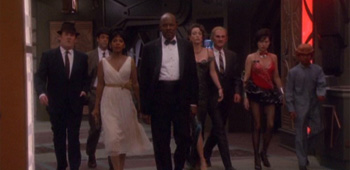
A lot of fans commented that they were surprised “Badda-Bing, Badda-Bang” didn’t make it to the soundtrack collection. Producer Ford Thaxton says he would definitely think about including the music in a second volume should sales of the first be strong enough.
TrekCore: Do you know if there’s an over-arching plan for La-La Land to put out ‘Best of Deep Space Nine’, ‘Best of Voyager’, or a ‘Best of Enterprise’ series? Or do you just get them as they’re announced?
Ford A. Thaxton: There are all sorts of particulars on these things. I must confess that Voyager was not my personal favorite Star Trek show; someone said, “What about Voyager?” We’ll get to that. I’m sure that if sales warrant it, they’ll get to that. Enterprise would certainly be up next on the batting order. DS9, you know, let people hear it.
You know, “Badda-Bing“… that is one that I really thought about. It just wasn’t going to work for this one. I mean, it was kind of a case of doing something along the lines of “Our Man Bashir” – which is the one that everybody just loved – I may have flipped a coin! Sometimes a decision comes down to that.
TrekCore: I can only imagine how difficult it is when you’ve got a set amount of CDs to fill and you’ve got over 170 episodes to whittle down.
Ford A. Thaxton: The thing of it is, after it’s done and people hear it, that’s when you hear things – “Why didn’t you do this? Why didn’t you do that?” – but the goal here was to try and do as broad an overview as possible. It basically came down to three guys – myself, Mr. Banning, and Mr. Nelson. As fans of the show, trust me… when James Nelson – who is not a soundtrack geek, he’s a straight-ahead, normal guy – says, “We have to have Garak’s stuff!”, we’ll have Garak’s stuff.
Actually, that was another show we looked at – “The Wire“. That was another one that we gave some serious consideration to, but we settled on “The Die is Cast“, which essentially kicks off the whole Dominion War and everything. We included a lot from that one, because I thought it was a great score. It had these great moments in it, on Dennis’ disc. My particular favorite from that particular episode is the torture scene, which just says so much about the characters. Dennis just makes that whole scene very powerful. We tried very hard to balance off a lot of differing elements to get where we’re at now, and I think it is a great set. I really do. I think we show off every composer in their best possible light, and we tried to give something that if you’re a fan of the show, you’ve got some of the really big moments that everybody remembers.
All kidding aside, the one issue that I’m a little sensitive to myself is, you’re sitting there, and you’re the one having to make the call. I had the same problem on TNG; people were surprised that I didn’t include “Power Play“. The problem is that when you listen to it, and you listen to the other things we’ve got… there were certain things I wanted, and certain things that were very similar in tone – but that’s me; I’ll take the hit for that.
TrekCore: You’ll never be able to satisfy everybody, because for every track you include that you think, “Yeah, they’ll want that one”, you’re going to get someone who says, “Well, actually, I wanted THIS one as well!” It’s the nature of the beast.
Ford A. Thaxton: Making fans happy… you try hard. All I hope is that people enjoy this – and if they enjoy it, that’s all I need.
TrekCore: Totally – I mean, I’m a huge fan of Deep Space Nine; it’s probably my favorite Star Trek series. When I received the cover art and the track listings, my eyes just lit up, because you guys really did put everything on that stuck in my mind.
Ford A. Thaxton: Hey, you never know, there may be a follow-up. Who knows, maybe they’ll do another TNG one. I already kind of have a list – if we go back and do, say, TNG, I already know. That one, that one, and that one! Maybe we can get that George Romanis one I really wanted.
TrekCore: That’s the thing. The TNG set had a subtitle of “Volume One”. That’s automatically making the assumption…
Ford A. Thaxton: That was my fault! “Why don’t we call it ‘Volume One’?” Everyone went, “Okay!” I’ll own up to that one!
That was the awful thing about doing this – we went back and started watching the show, and oh shit, now we’re hooked again! Dammit, we’ve got to sit down and start watching them all! I have certain moments in the show that I love. There’s a show in the first year – “Move Along Home“, it may be…
TrekCore: One of the worst episodes, Ford!
Ford A. Thaxton: Ah ah ah, it’s an important episode!
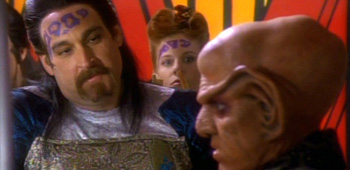
Cringed at by so many fans, “Move Along Home” seems to stick in Soundtrack Producer Ford Thaxton’s mind as one of the stand-out episodes of DS9’s first season!
TrekCore: You’ve got to defend that for us.
Ford A. Thaxton: I’ll tell you why. It’s a very TNG-esque show, right? But the best moment in that show – the memorable moment – is when [Sisko, Bashir, and Dax are] going through this whole thing about what they’re going to have to do, and they go to Kira… and Kira just looks at these guys like they’re completely out of their minds. “Hey, I’m not Federation! I don’t do this!” Something along those lines – that was the moment I remember from that. She just says, “Wait a minute!”
That’s the fun part of the show. I love those characters. That’s my other observation of the show – watching it again – the character who went through the greatest metamorphosis in the whole show was Kira. When you first meet her, she’d just as happily pull out a knife and slice a Cardassian’s throat then have a cup of tea… and by the end of the show, she turns out to be the savior of Cardassia. People just responded to the characters, I can tell – whenever any composer had a show with Garak in it, they just went, “Ooh, this a good one.” They loved Garak, or Jeffrey Combs, or any of those guys.
People respond to things, and Deep Space Nine just has a quality which I think is, in the long term, going to survive more than some of the other shows. Deep Space Nine was, in my opinion, more of a character-oriented show, and I think that’s the thing where all the composers just responded to those characters. Everybody. Some shows, people work on ‘em, other shows, they were there every week. I mean, Jay Chattaway would say, “It’s a Garak show! I got an Odo show, yay!”
I actually like the Ferengi. So there you go.
TrekCore: I’m going to end on probably a really difficult question for you – but I think it’s relevant. On this four-disc set, what is your favorite cue or track, and who is your favorite composer from Deep Space Nine?
Ford A. Thaxton: Oh, that’s loaded! I have to be diplomatic here. I will say, flat-out, that Jay Chattaway and Dennis McCarthy have been friends of mine for twenty-five years or longer; I love them as human beings, and I love their work. I can’t give that answer – it would be unfair – but I will say that in the case of Dennis, the piece from “The Visitor” just destroys me, for a variety of reasons. I think that is just an amazing piece. For Jay, my favorite piece on this particular set – I happen to like it a lot – it’s a cue in, think, “The Search“, where they’re going out and starting the long search… it’s everything Jay does great.
Of the rest of them, there are certain moments… but I would say that Dennis is sort of the voice of Deep Space Nine, and Jay elaborated on what Dennis did. They were a great team to work on the show. I think that sometimes people are a little unfair to both of them, in the sense that I have seen these shows without any score – trust me, these guys saved [the production’s] asses more times than you can imagine!
The stuff on this set that I respond to personally is the emotional stuff.
TrekCore: This is an interesting point that you just raised – a lot of fans do say, on message boards all across the internet, that Dennis and Jay’s music has a “sonic wallpaper” feel to it, what is your view of that description?
Ford A. Thaxton: Here’s a technical thing people have to remember – and Dennis summed it up pretty well – it’s ‘air conditioning’. You have to do ‘air conditioning’ music, because here’s the thing on a show like this: producers, like Rick Berman, have certain things they like. One thing you will rarely hear on any Star Trek show is snare drums. They never liked snare drums. There are certain things they liked, and certain things they didn’t. You won’t hear a violin solo, virtually ever after the first season of TNG.
You also have the fact that, dramatically, because they have the air conditioning going – whatever you want to call it, the life support – there’s a certain range that you just can’t write in, because it’s just going to get lost. What these guys had to do was – and I was in sessions – Dennis treated it like an ongoing saga. You have a composer… and [the producers] did not like reoccurring themes. That’s the one thing you will find; they just never liked tunes, like in the first season of TNG, there was an ongoing idea for Picard. There was a ‘Picard theme’ that Dennis had. After “Yesterday’s Enterprise“, I think he did it once more, and then they said, “Eh… don’t use that anymore.”
You have people who sit there and they like certain things, and once you understand that… that’s one of the reasons these guys get the jobs, because if you don’t give [the producers] what they want, they’re going to find somebody else. And that’s true with any profession.
This is the job of a composer for film or television. Their job is to come in and solve problems. The only thing the client ever wants to hear – and this is true, as I said, in any profession – is “Sure. No problem!” That’s the truth, and these guys managed. The thing of it is, if you listen to it on a musical level – and we found that out when we did TNG and the expanded Generations – is that when you start listening to it with a kind of a critical ear, there’s a lot going on that you sometimes feel more than you hear.
I think when you hear the set, you’ll actually be able to hear what these guys actually did – and it is anything but “the same”.
TrekCore: That’s perfect! Ford, it’s been fantastic listening to you.
Ford A. Thaxton: It’s been a pleasure talking to you.
Go to Part: 1 2
We have some special preview tracks from Discs 3 and 4 of the set below:
- Yamok Sauce (from “Progress“, John Debney)
- Quark Ties Splint / Trudging Montage (from “The Ascent“, David Bell)
- Computer, What Day Is It? / It’s a Fake (from “In the Pale Moonlight“, David Bell)
- Worf Kills Gowron (from “Tacking into the Wind“, David Bell)
- Joran’s Nocturne (from “Field of Fire“, Gregory Smith)
- War Adagio (from “The Siege of AR-558“, Paul Baillargeon)
- Major Gigabytes (from “Our Man Bashir“, Jay Chattaway)
- Smooth Talker / Attitude Adjustment (from “Our Man Bashir“, Jay Chattaway)
- Prelude / Famous Fight (from “Trials and Tribble-ations“, Dennis McCarthy)
- Death / Treaty / Mojo Yojo (from “What You Leave Behind“, Dennis McCarthy)
- Final Battle / Trapped (from “What You Leave Behind“, Dennis McCarthy)
- Finality / The Way You Look Tonight (from “What You Leave Behind“, Dennis McCarthy)
The 4 CD Star Trek: Deep Space Nine Soundtrack Collection is available to order now from La-La Land Records at their website, www.lalalandrecords.com. The set is limited in number to 3000 units and will set you back a very reasonable $49.98, working out at under $12.50 a disc. Stay tuned to TrekCore for our full review of the set coming soon!
